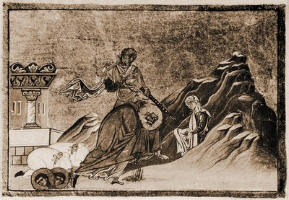
The Works Of Dionysius The Areopagite Volumes 1 & 2
SECTION XXXII
It is to be laid down that being belongs to the Evil as an accident and by reason of something else, and not from its own origin, and thus that that which comes into being appears to be right, because it comes into being for the sake of the Good, but that in reality it is not right for the reason that we think that which is not good to be good. The desired is shewn to be one thing, and that which comes to pass is another. The Evil, then, is beside the path, and beside the mark, and beside nature, and beside cause, and beside beginning, and beside end, and beside limit, and beside intention, and beside purpose. The Evil then is privation and failure, and want of strength, and want of proportion, and want of attainment, and want of purpose; and without beauty, and without life, and without mind, and without reason, and without completeness, and without stability, and without cause, and without limit, and without production; and inactive, and without result, and disordered, and dissimilar, and limitless, and dark, and unessential, and being itself nothing in any manner of way whatever. How, in short, can evil do anything by its mixture with the Good? For that which is altogether without participation in the Good, neither is anything, nor is capable of anything. For, if the Good is both an actual thing and an object of desire, and powerful and effective, how will the contrary to the Good,—that which has been deprived of essence, and intention, and power, and energy,—be capable of anything? Not all things are evil to all, nor the same things evil in every respect. To a demon, evil is to be contrary to the good-like mind—to a soul, to be contrary to reason—to a body, to be contrary to nature.

 Keep Site Running
Keep Site Running